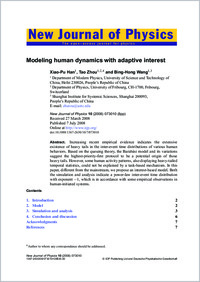Modeling human dynamics with adaptive interest
- Han, Xiao-Pu Department of Modern Physics, University of Science and Technology of China, Hefei, China
- Zhou, Tao Department of Modern Physics, University of Science and Technology of China, Hefei, China - Department of Physics, University of Fribourg, Switzerland
- Wang, Bing-Hong Department of Modern Physics, University of Science and Technology of China, Hefei, China - Shanghai Institute for Systemic Sciences, Shanghai, China
-
07.07.2008
Published in:
- New Journal of Physics. - 2008, vol. 10, p. 073010
English
Increasing recent empirical evidence indicates the extensive existence of heavy tails in the inter-event time distributions of various human behaviors. Based on the queuing theory, the Barabási model and its variations suggest the highest-priority-first protocol to be a potential origin of those heavy tails. However, some human activity patterns, also displaying heavy-tailed temporal statistics, could not be explained by a task-based mechanism. In this paper, different from the mainstream, we propose an interest-based model. Both the simulation and analysis indicate a power-law inter-event time distribution with exponent -1, which is in accordance with some empirical observations in human-initiated systems.
- Faculty
- Faculté des sciences et de médecine
- Department
- Département de Physique
- Language
-
- English
- Classification
- Physics
- License
- License undefined
- Identifiers
-
- RERO DOC 10603
- DOI 10.1088/1367-2630/10/7/073010
- Persistent URL
- https://folia.unifr.ch/unifr/documents/300783
Statistics
Document views: 85
File downloads:
- zhou_mhd.pdf: 165
